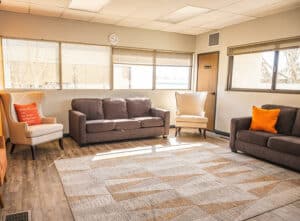Sober Living Homes
- Inpatient Rehab
- Outpatient Rehab
- Intensive Outpatient Programs
- Inpatient Vs. Outpatient Rehab
- Gender-Specific Treatment
- Luxury Rehab
- Short-Term Rehab Options
- Sober Living Homes
- Intervention
- Treatment Process
- Treatment Therapies
- Faith-Based Rehab
- Support Groups
- Paying for Rehab
- Rehab & Insurance
- During Rehab
- After Rehab
Sober Facilities For Extended Stays
A sober living home (sometimes called a halfway house) operates as a bridge between an inpatient facility and the “real world.”
Once leaving an inpatient facility and returning home, you may be struggling with adjusting back to daily life. Sober living homes offer an in-between recovery option that allows you to reinforce the lessons learned in rehab.
For a lot of people in recovery, moving into a sober living home after treatment makes the difference between going back to their old habits or continuing on the path of sobriety.
A sober living home is a great option to alleviate any concerns you may have about going from such a monitored environment right back into daily life. Tragically, for many newly in early recovery, sober living homes provide their only option for a safe, sober living scenario.
It doesn’t provide the same level of structure as an inpatient facility, but it does present an intermediate sober environment that encourages residents to develop healthy coping skills and habits for when they return home.
Online Addiction Counseling
Get professional help from an online addiction and mental health counselor from BetterHelp.
- Access to Therapy 24/7
- Easy Online Scheduling
- 20,000+ Licensed Therapists
Paid Advertising. We may receive advertising fees if you follow links to the BetterHelp site.
What To Expect In A Sober Living Home
In an inpatient treatment center, patients are totally immersed in their rehab programs and generally don’t have much dependence. In sober living homes, that is not the case.
Residents aren’t bound to the sober living home’s campus and can come and go as they please. This allows individuals in recovery to feel like they are easing back into normal life and can start going back to their daily tasks and responsibilities. Although sober living homes are less restrictive than inpatient facilities, they still have rules that residents must abide by, including curfews and group meeting attendance.
There are many benefits to staying in a sober-living home, including attending 12-step programs, creating structure, accountability, and creating a sober fellowship. A big part of staying in a sober living home is creating positive friendships that help to reinforce the desire to abstain from drugs and alcohol.
This support system allows residents to avoid the isolation that can sometimes come with returning home while in recovery. It further provides an environment to support recovery from substance abuse and addiction for those who are emerging from rehab. Sober living homes provide a combination of freedom and structure to help the person begin to adjust to life outside of rehab. They are set up specially to serve as transitional housing for people coming out of treatment.
Featured Centers with Sober Living Options


Improve Your Chances Of Staying Sober
A sober living home acts as a supplement to an individual’s recovery. It is an alternative to going from an immersive care environment straight to a totally unstructured environment at home. Because sober living homes replicate normal, everyday life situations while instilling healthy habits, they help to reduce the chance of relapse.
Sober living homes help residents do a number of things that will guide them throughout recovery:
- Making amends with friends and family members affected by one’s substance abuse.
- Finding a job.
- Locating housing after treatment.
- Adjusting to sober living in an unstructured environment.
Additionally, following a carefully designed aftercare plan, including a relapse prevention plan created in therapy, allows you to identify triggers that may entice you to use once you are living in the community again. It further provides healthy coping skills and emergency contact numbers in times of high-stress or high-cravings/urges to use. This way you will have a plan of action for what to do during these times and have healthy ways to manage triggers in your daily life.

Break free from addiction.
You have options. Talk about them with a treatment provider today.
When To Move Into A Sober Living Home
You should move into a sober living home after a stay at an inpatient facility if you have any concerns about staying sober on your own.
The most important thing I can do in my life is remain clean and sober to be a testament that recovery is possible. The halfway house was an integral part of the learning process. When I was there I saw women fail and women succeed. I was able to learn from these women, and find friends in recovery.
The option that sober living homes provide is one that is significantly useful to many in recovery. Generally, those that are staying at a sober living home will remain there for at least 90 days, but stays can be arranged for as long as necessary.
Check if my insurance covers rehab
Addiction Center is not affiliated with any insurance.
Finding A Sober Living Home
Many people in recovery find it helpful to their sobriety to move into an environment with a readily available support system. If you need help finding a sober living home or other treatment options, contact a treatment provider today.
Looking for a place to start?
Join the thousands of people that have called a treatment provider for rehab information.
Free and confidential
Available 24/7
Access to professional treatment
Published:
Author
Jeffrey Juergens

-
Jeffrey Juergens earned his Bachelor’s and Juris Doctor from the University of Florida. Jeffrey’s desire to help others led him to focus on economic and social development and policy making. After graduation, he decided to pursue his passion of writing and editing. Jeffrey’s mission is to educate and inform the public on addiction issues and help those in need of treatment find the best option for them.
- More from Jeffrey Juergens
Reviewed by Certified Addiction Professional:
Theresa Parisi

Theresa Parisi is a Certified Addiction Professional (CAP), Certified Behavioral Health Case Manager (CBHCM), and International Certified Alcohol and Drug Counselor (ICADC) with over 12 years of experience in the addiction treatment field.
- More from Theresa Parisi
Sources


Recovery Starts Today
Call Now For Addiction Support




Moonlight Mountain Recovery
Pocatello , ID

Tarzana Recovery Center – TRC
Tarzana , CA


Hollywood Hills Recovery
Los Angelos , CA

The District Recovery Community
Huntington Beach , CA

Renaissance Recovery
Fountain Valley , CA

California Prime Recovery
Fountain Valley , CA


OC Revive – Drug and Alcohol Rehab
Lake Forest , CA

OC Revive – Teen Rehab Center
Lake Forest , CA


